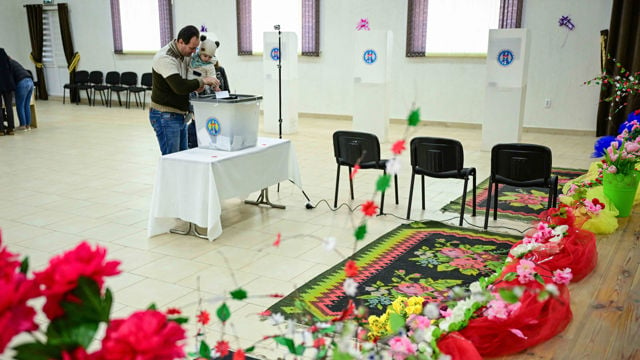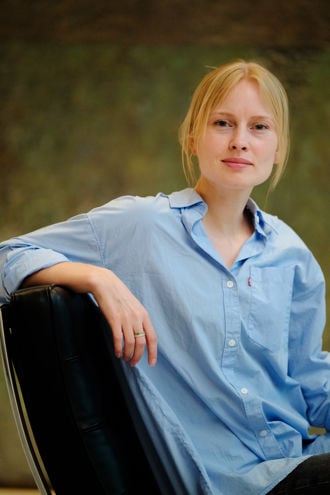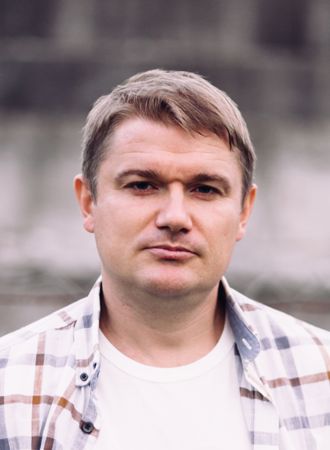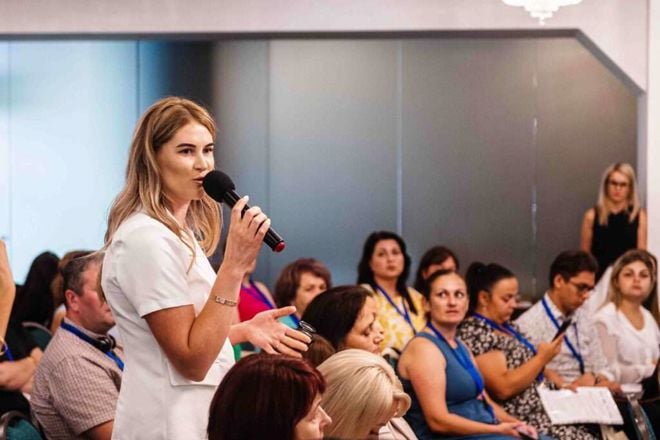This isn’t just about exposing misinformation. It’s about strengthening democracy, building trust, and ensuring that all groups in society have access to reliable information.
Moldova fights back against fake news

A person casts their vote in Moldova’s presidential election in Costesti, in the north of the country, on November 3, 2024. Maia Sandu was re-elected as president later that month.
From identity politics to false NATO bases - Russian propaganda is flourishing on social media ahead of Moldova’s parliamentary elections on 28 September. Norway supports the fight against disinformation.
Ahead of the election, Russia has intensified its disinformation campaigns, targeting both voters in Moldova and Moldovan citizens residing in EU countries. The strategy is to create chaos, polarisation, and distrust.
Facts first – with Norwegian support
Through the Nansen Support Programme, Norway supports independent media, journalists, and civil society organisations in Moldova. IMS (International Media Support) and the Institute for War & Peace Reporting (IWPR) provide local actors with the tools they need to identify and counter false narratives — before they gain traction.

The war in Ukraine has had enormous consequences for neighbouring Moldova. The country, one of the poorest in Europe, has faced sharply increased energy prices, economic uncertainty, and a large influx of refugees—making it especially vulnerable to Russian propaganda.
The lies that divide
The disinformation campaigns take many different forms:
- NATO bases: This summer, Russian-language channels spread claims that NATO was building a base in Moldova to provoke Russia. The story was widely disseminated on Telegram and aimed at creating fear.
- Western control: When the EU or Norway provides support, the narrative is twisted to suggest Moldova is losing its sovereignty and is being ruled from the West.
- Gender-based harassment and identity politics: Female journalists and politicians are subjected to targeted harassment.
– These narratives aren’t randomly selected. They are carefully constructed to divide the population and make society more susceptible to external pressure, says Wågen.
Prebunking with an impact
One of the most innovative initiatives is a project developed by IMS in 2024.
Instead of debunking misinformation after it has gained a foothold, a group of Moldovan independent media organisations collaborate to identify disinformation early and ensure that fact-based content reaches audiences before they are exposed to false narratives – so-called prebunking.

There is usually a window of about 36 hours from the start of a disinformation campaign until it reaches its peak. We encourage our media partners to use this time effectively to spread accurate information -so that the truth is heard first.
This requires extensive monitoring of the information landscape, ongoing analysis, and rapid response. IMS therefore partnered with the Ukrainian tech company Let’s Data, which uses an AI algorithm to analyze Moldova’s digital content around the clock. The system sends automated alerts about new disinformation threats.
This winter, Moldova was hit by a new energy crisis. Kremlin-friendly actors tried to exploit this by discrediting the government, undermining Moldova’s EU accession process, and justifying Russian policies. After a period where such stories dominated, targeted local response resulted in fact-based information taking over and accounting for 60–65 percent of the information landscape. Even Russian-speaking groups, who are particularly vulnerable to Russian propaganda, increasingly sought fact-based information.
Local resistance – IWPR’s contribution
Another example is a project led by IWPR and their partner Transparency International Moldova to strengthen local communication in Moldova.
More than 800 public employees across Moldova have received training in communication, transparency, and crisis management. The project has demonstrated the importance of clear, simple messages—instead of long, complex texts that few understand.

31 workshops were conducted in all districts of Moldova.
One of the most exciting aspects of the project is the further development of local “crisis cells.” Journalists, organisations, and authorities work together to stop rumors and fake news—in everyday life and during crises. This has worked especially well in areas such as Ungheni, Causeni, and Soroca, where crisis cells have addressed misinformation on everything from gas prices to disease outbreaks.
At a concluding gathering, municipalities, local politicians, media, and organisations met to share experiences and find better ways to communicate. The goal has been to build trust and reach residents—even through social media like TikTok, where many people actually receive their information.
– If people are on TikTok, we have to be there too. We won’t get through any other way. Disinformation can’t be defeated completely, but its effects can be reduced. Continuity is more important than one-off campaigns, said one of the participants.
Disinformation is not an isolated problem for Moldova.
– At a time when Norwegian elections and public debate can also be influenced by external actors, the fight against fake news is a shared responsibility. With Norwegian support, Moldova stands stronger - and we stand together with them for facts, freedom, and the future, says Wågen.